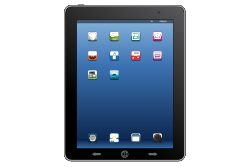Are tablet computers right for business?
 Tablet computers have been around for years. The idea was first mooted decades ago, and Microsoft first demonstrated a tablet running Windows in 2001. However, it was the launch of Apple’s iPad which really pushed tablets into the mainstream
Tablet computers have been around for years. The idea was first mooted decades ago, and Microsoft first demonstrated a tablet running Windows in 2001. However, it was the launch of Apple’s iPad which really pushed tablets into the mainstream
As a result, Apple has sold a lot of iPads and there are plenty of competing models to consider, too.
So, how can you put them to work in your business?
Doing serious work with a tablet
When tablets first appeared, there was some doubt as to whether they could really be used to do 'serious' work. Their status was more 'CEO's toy' than 'productivity workhorse.'
But make no mistake: that has changed.
These slate-like devices have become commonplace. Light and with long-lasting batteries, they provide an excellent option for working on the move.
Their touch screens are generally adequate for tapping out short emails and editing documents, but you can always add a portable keyboard for serious typing work.
And with a wide range of apps available, it's possible to use a tablet to do many of the tasks you usually do with your main computer. From email and working with documents to accessing websites and checking your accounts, tablets are popular and versatile.
Personal tablets at work
Even if your business hasn't invested in tablet computers, you may find that staff who buy tablet computers for personal use want to use them for work as well.
This is an example of the BYOD (bring your own device) phenomenon, where companies allow employees to use their personal devices for work.
In fact, you could argue that tablet computers have already blurred the lines between personal and business computer use.
There's a good chance your staff are already bringing them into the workplace and use them for work purposes when they are at home, commuting to and from the office or when they are out and about on company business.
If this is happening in your business, it can create challenges: who’s responsible for the security of information stored on tablet computers owned by your employees? What happens if a tablet containing sensitive data gets stolen?
These are questions you can handle via discussions with your staff and by having a clear mobile device security policy.
What are tablet computers for?
When people bring their own tablet in to work, it’s because they see opportunities to be more productive using their own equipment rather than what’s available to them in the office.
So at the very least, it’s worth understanding what tablet computers can do and how you can get the most out of them. Then you can decide whether it’s worth introducing them into your business.
There may be times when tablets can make your staff more productive. In some situations, they can be a good replacement for a laptop or netbook. In others, they can be a valid extra device for people to use. For instance:
- Presenting and consuming visual material. Instead of printing stuff out and showing presentations on computer screens, you can view and show documents, images, presentations and video clips directly from a tablet computer screen.
- Offering services in a retail or leisure environment. Companies working in retail or leisure can use tablet computers to give customers a better customer experience. For instance, retailers can have them available in store to check stock levels or product information. There’s a ‘wow’ factor too – for an extreme example, take Apple, which has replaced the paper signs in its shops with iPads.
- Viewing and checking reports. As a device you can hold like a clipboard, tablet computers are useful for accessing reports and company data. You can potentially cut out a lot of printing by using a tablet instead.
You may want to develop an IT policy that covers how tablets should be managed in your company, and which employees may be issued with them.
- What to look for in a desktop computer
- Keeping mobile devices secure
- Find an IT supplier in your area




